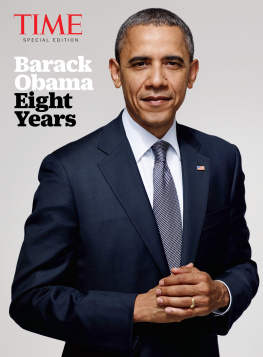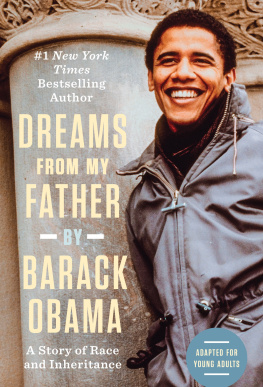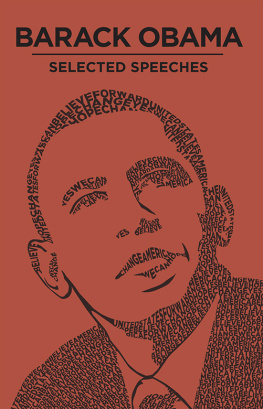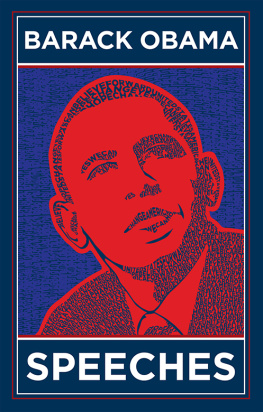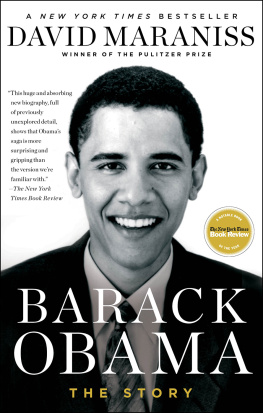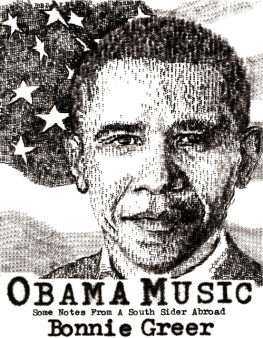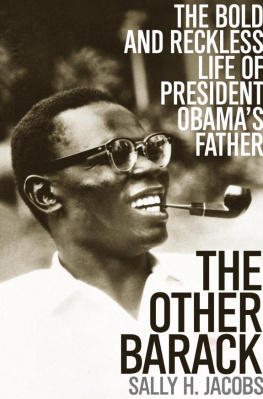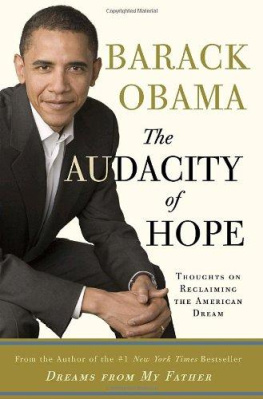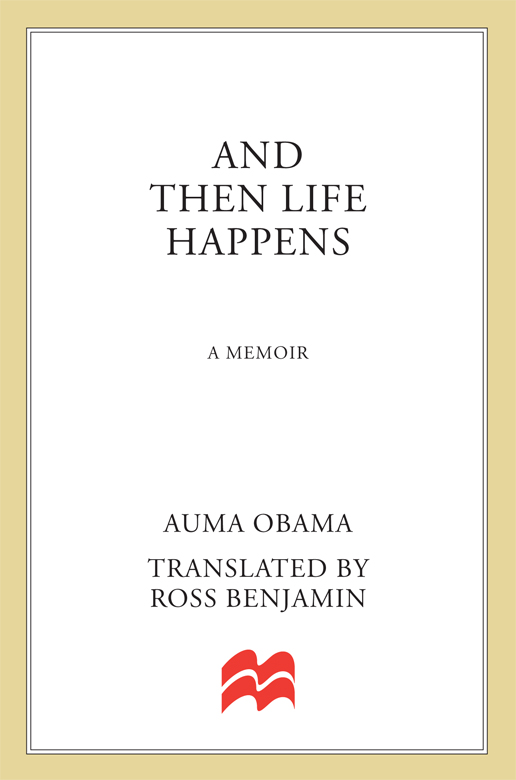
In loving memory of my father, Barack Hussein Obama, I dedicate this book to my family
Authors Note
This book was originally written in German. Some may wonder why, when English is actually a language I grew up with. But the fact that I studied and worked in Germany made it seem natural to tell my story in the language in which I had spent my formative adult years. The writing came more easily to me, and in many ways my main audience was a German one. They, I knew, would be able to relate immediately to many of my experiences.
I was, of course, thrilled to receive an offer for an English version of my German book. Finally, all my friends and family who had been asking when they, too, would get to read my memoir would have the opportunity to do so. But I underestimated the challenge of reproducing the narrative. I realized that the way I think and express myself in German differs from the way I think and express myself in English. Moving between the two cultures, I had always transitioned smoothly from one to the other, and so I had never noticed this difference until I dealt with telling the same story in both languages. It became necessary to work in close collaboration with my editor, Daniela Rapp, and a German-English translator, Ross Benjamin, to render a version that best captured my voice in English. I believe this process has been a success.
Out of respect for their privacy, the names of some people who appear in this book have been changed. The dialogue in this book has been reconstructed to the best of my recollection.
Auma Obama
Contents
KENYA
O H, MY GOD! Oh, my God! I cant believe it!
For the second time, Lucy, my assistant, read the letter she was holding in her hand. Flustered by its unexpected arrival, I had desperately needed to show it to someone.
I stood next to Lucys desk and could tell clearly by the look on her face that she was itching to read the letter once againthis time aloud. Immediately, I emphatically gestured to her not to do so. The last thing I wanted was for the whole office to find out what was in the letteror even worse, who had sent it. For some time now, I had been getting an enormous amount of attentionbecause my brother Barack had, against all odds, become the first African-American president of the United States. Almost overnight, Ias a member of his family in Africafound myself in the spotlight. And now it seemed that even levelheaded Lucy was getting caught up in all the excitement.
You absolutely have to frame the letter! Absolutely! she cried. Laughing, I took the letter from her. Really, Auma! she added in earnest. Imagine how much it will be worth in a few years. Now I really had to laugh.
You Kikuyu, I teased, feigning reproach.
The Kikuyu, the largest ethnic group in Kenya, have a reputation for good business sense. Lucy grinned. She is actually Kamba, a different ethnic group, but is married to a Kikuyu man.
Must have rubbed off on me, she replied with a shrug and a mischievous smile.
I noticed our coworkers looking at us with growing curiosity.
Dont you think it would make more sense to answer the letter instead of keeping it as a museum piece? I went on, lowering my voice and trying to bring not only Lucy but also myself back down to earth. All the while, another question was whirling around in my mind: How on earth was I to go about answering a letter from Hillary Rodham Clinton?
* * *
Only a few minutes earlier, the letter had been brought to me personally by a U.S. embassy staff member. It was preceded by a call to my office at the international humanitarian organization CARE to confirm that I would be available to take delivery of the letter. Before I knew what this was all about, my immediate reaction was to go on the defensive. I thought it was just another of the numerous interview requests I had been receiving. Overwhelmed by the volume of calls, I had started to feel like a cornered animal trying to take cover from the journalists. The fact that those inquiries always reached me exclusively on my cell phone and that only a few people knew my office number had at that moment completely slipped my mind.
At the height of the election in 2008, I had intentionally given out my cell number, so that anyone with questions about the Obama family could contact me. I had believed that I could easily deal with the media. After all, I thought, I had worked as a journalist myself when I lived in Germany. By providing my number, I had mainly wished to protect my grandmother, whom everyone called Mama Sarah, from all the media fuss. But I had not been prepared for such a flood of calls.
Because Mama Sarah was also Baracks grandmother, everyone wanted to speak to her. They wanted her to tell them about his family, to bring to light the missing pieces of the puzzle that Barack Obama was for them. Who exactly was this black man and son of an African who had dared to aspire to the office of president of the most powerful nation in the world? Where were his roots? Who was his family?
In search of answers to these questions, scores of reporters from across the globe boarded planes and traveled to Nairobi, the capital of Kenya. From there they continued on to rural western Kenya, to Alego Nyangoma Kogelo, an unassuming little village not far from the shores of Lake Victoria that was our ancestral home. There, on the Obama family homestead, lie the mortal remains of Barack Hussein Obama Sr. (19361982) and Onyango Hussein Obama (18791975), the father and grandfather, respectively, of the forty-fourth American president. And to this day, it is the home of our grandmother, Mama Sarah.
On many occasions I was at my grandmothers side when she was interviewed, and I never ceased to be amazed and delighted at how well she, eighty-seven years old at the time, was able to grasp the intricacies and dynamics of the American electoral process. She answered all the questions with intelligence and humor, sticking to the point and not digressing. That being said, I was also always conscious of not wanting to overtax her at her age and tried to keep the media interest from getting out of hand.
* * *
I carried Hillary Clintons letter around with me for days. I felt that any response had to be well thought through. Not only was I in a state of mixed emotionsoverjoyed at my brothers success, while at the same time not fully prepared for the unrelenting attention I now received as a member of the Obama familybut the letter from the U.S. Secretary of State also brought back some painful memories. During the primaries, she had run against my brother for their partys nomination. Both were Democrats, but they had also been the fiercest opponents. Recollections of negative attacks on my brother from the Hillary camp were still fresh in my mind. And because I was not accustomed to the rules of political campaigning, at the time everything had seemed to me to be playing out on a very personal level. I had feared that his rivals team wanted not only to win the election, but also to ruin my brothers political career. And now here was a letter from Hillary Clinton thanking me for the wonderful moments we shared in Washington and wishing me all the best. I could hardly believe it.
On the occasion of the inaugural luncheon, I had been seated with Hillary and Bill Clinton and other dignitaries of American politics. As we ate, the conversation revolved around Baracks swearing-in, global politics, development aid, Kenya, and my work with CARE. I even received a number of tips to pass on to my brother and his wife, Michelle, wise advice on how to lead a somewhat normal life in the White House.


